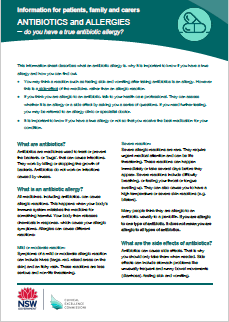Antibiotic allergies
Penicillin is the most commonly implicated medication when patients report a drug allergy. However, a growing body of evidence suggests that as few as 10% of people who report they are allergic to the antibiotic actually are.
Often, patients are labelled as allergic to penicillin in their medical record without adequate enquiry into the nature of their reaction. When prompted further about their reactions, many patients who report an allergy have experienced a side effect of the drug, and do not meet the criteria for a true drug allergy.
Being incorrectly labelled with an antibiotic allergy has consequences for care and treatment. It leads to the use of potentially less effective and often broader spectrum antibiotics which may increase adverse events and lead to antibiotic resistance.
The Clinical Excellence Commission supports NSW facilities to improve antibiotic allergy labelling. A multidisciplinary group was convened to develop antibiotic allergy resources to guide local teams in improving antibiotic allergy labelling. The resources include educational materials for patients and carers, assessment tools, and letter templates among other materials to support conducting an antibiotic allergy project.
Resources
These antibiotic allergy resources were created by a multidisciplinary team and provide a range of documents to help teams monitor and improve antibiotic allergy labelling processes. These resources have been tested at St George Hospital as part of their penicillin allergy assessment and de-labelling project.


Do you have an antibiotic allergy? What you should know
Information for patients and carers
- Antibiotic allergy assessment tool
- Template GP letter - removal of antibiotic allergy label following assessment or direct oral rechallenge
- Beta-lactam antibiotic allergy wallet card for patients
- Example measurement strategy for antibiotic allergy projects
- St George Hospital – Penicillin allergy assessment and de-labelling project
